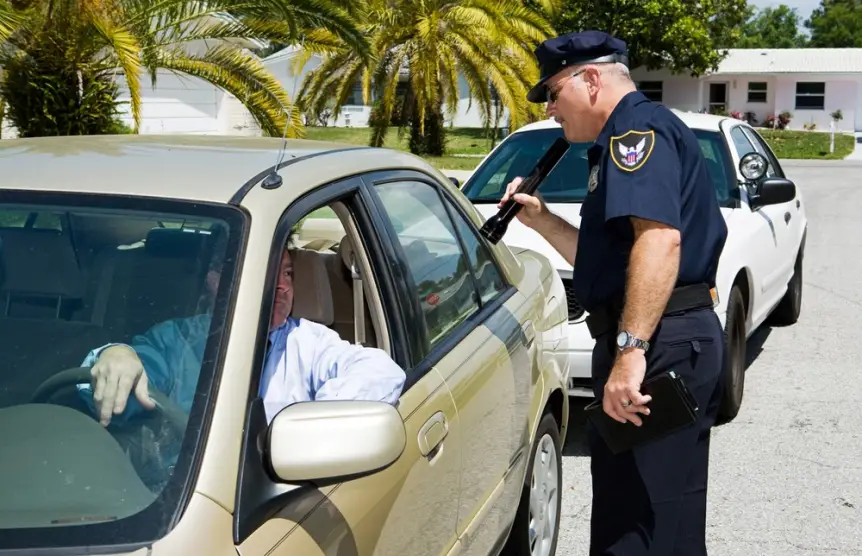The Fourth Amendment of the U.S. Constitution protects individuals from unreasonable searches by police officers. The protection from unreasonable searches extends to your vehicle. As such, you can refuse to allow an officer to search through your car.
There are exceptions to this right, however. For example, there are some circumstances in which an officer may be free to search your vehicle without needing your consent. Our lawyers explain each of these scenarios and what you can do when they happen.

A police officer inspects a car with a driver inside. When a police officer asks to search your car, constitutional law protects you and allows you to refuse.
What to Do When Stopped By the Police in Your Car
When the police pull you over, you might feel worried, frightened, or annoyed—perhaps a combination of many emotions. However, you should try not to be argumentative. Instead:
- Be polite and accommodating to any legal requests.
- Don’t lie or provide any false information or documents.
- Make a note of the officer’s name, the date and time of the encounter, and any significant conversation you had.
- Don’t escalate the situation, and always keep your hands visible.
Following these rules will ensure that the police have nothing to use against you. This is the best practice for any traffic stop, and you should always keep this in mind. Being polite will always yield the best results when you refuse a search of your vehicle.
The Police Can Search Your Car If Given Consent
Officers without probable cause or a warrant may still be interested in searching your vehicle. While you have the right to refuse, you also have the right to consent.
Once you have consented to a search, the officer is free to investigate your vehicle as they see fit. Evidence gained through such a search is as valid as evidence gathered with probable cause or a warrant.
How to Refuse a Search of Your Car
If you are stopped in your vehicle by the police, you aren’t required by law to allow them to search it. As long as you are not under arrest or the officer does not possess a warrant signed by a judge authorizing the search of your vehicle, you can inform the officer that you don’t consent to a search.
When you are stopped and asked if the officer can investigate your vehicle, you can politely but firmly say, “I do not consent to a search of my vehicle.” Even if they search your car, any evidence they found will be inadmissible because you did not grant permission for the search.
Plain Sight Exception
An officer does not always need probable cause to search and seize an item in your vehicle. Instead, thanks to the plain view doctrine, officers need only see an illegal item to investigate and seize it.
Take a driver who was pulled over for speeding. If an officer can see an open bottle of alcohol on the passenger’s seat, that bottle may get taken as evidence for an open container infraction. Furthermore, the combination of speeding and an open container can constitute probable cause for a DUI arrest.
Other Exceptions to the Rule
An officer does not always need to ask you for permission to search a vehicle. A warrant, per the Fourth Amendment, can allow the officer to search your vehicle. Likewise, the officer may be entitled to search your car if they have an appropriate level of suspicion that you have committed a crime.
What Counts as Suspicion?
While the Fourth Amendment does offer broad protection from unreasonable searches, the definition of “unreasonable” is an ongoing legal debate. Despite the occasional ambiguity, there are general levels of suspicion that surround a lawful search.
Reasonable Suspicion
On the most basic level, an officer must have some justification for stopping you. For example, an officer may stop you when driving if they believe you have committed a traffic infraction.
The standard for determining whether an officer has a right to stop you is known as reasonable suspicion. The police do not need to have witnessed you committing an offense to have reasonable suspicion.
If the officer has a reasonable suspicion that you may have played a part in a crime, they may conduct a pat-down of your outer clothing during a stop, which is known as a Terry stop. Its purpose is to ensure that you don’t pose a danger to the officer and assess your involvement in any potential crime. This is the extent of any search an officer may conduct with reasonable suspicion.
Probable Cause
Probable cause is a higher standard that officers must meet to conduct an arrest or search a person and their effects. For example, if an officer views your car swerving and smells alcohol on your breath when they stop you, they likely have probable cause to arrest you for a DUI.
As your vehicle could contain evidence related to the DUI, the police officer would have probable cause to search your vehicle for additional evidence.
Excluding Improperly Obtained Evidence
While there are many legal venues for an officer to obtain evidence against you, it is possible that there was a flaw in the procedure. For example, if you refused a search and the officer still conducted one, any evidence gathered would be inadmissible in court for a DUI case.
You can petition to have the evidence excluded from the proceedings by filing a motion to suppress. If you have any concerns about the search of your car during a stop, particularly if the search led to an open container violation or DUI arrest, you deserve to have your rights protected.
Should I Contact a Lawyer to Help Me?
If you were stopped for a DUI and had your car improperly searched, you can fight back against this violation of your rights. Getting a strong Los Angeles DUI attorney to help you with your case is essential, especially if you have minimal legal experience. Get in touch with an attorney as soon as you can.






